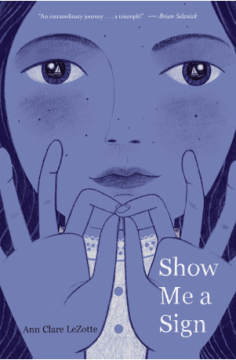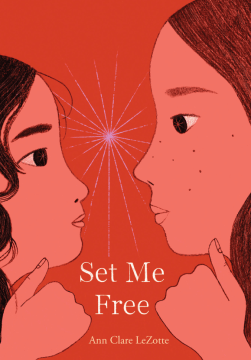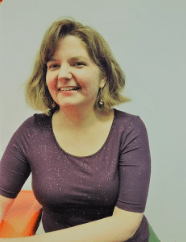I am delighted to welcome Ann Clare LeZotte to The Mixed-Up Files blog to talk about her award-winning book, SHOW ME A SIGN and her new release, SET ME FREE. I’ve never met Ann in person, but we are Twitter friends, and I’m a big fan, so I jumped at the chance to get to know her a little better.
Let’s do this!
Lisa: Tell us about Show Me A Sign and Set Me Free. 
Ann: They are the first two books in a trilogy about a girl named Mary Lambert who lives in Martha’s Vineyard in the early 1800s. Mary is deaf, but that’s not unusual. In her town of Chilmark, hereditary deafness is common (I in 4 are born deaf) and all the descendants of English colonists speak a special form of sign language, which we now call Martha’s Vineyard Sign Language (MVSL). But we see that people outside of her community view deaf people as inferior. Both books include members of the Wampanoag Nation who are fighting to keep their land. Mary is very curious and independent and had many exciting and some frightening experiences. The books are a combination of (if I may say so) well-researched historical fiction and adventure stories.
Lisa: How did you come to learn about the deaf community in Martha’s Vineyard?
Ann: I lived on Cape Cod in the 1990s and I visited Martha’s Vineyard for the first time in the winter. It was a cab driver from the airport to my bed and breakfast who told me about the island’s history of deafness. I became immediately fascinated!
Lisa: How did you research this project?
Ann: On that first trip, I visited the Chilmark Free Public Library and local bookstores. I asked a lot of questions—using my pen and pad, I wasn’t using oral speech at the time. Everyone was very friendly. From there, I visited the island other times. I walked the land I was going to write about. I studied many texts and old maps. I had sensitivity readers whose input was crucial in understanding all the perspectives in the community. I believe in showing characters in an engaging but also realistic way, prejudices and all.
Lisa: How do your life experiences impact the stories you tell?
I grew up on a different island—Long Island, New York. Like Mary, I was a beachcomber from a young age. I’m Deaf, and it’s important for me to share my history, language and culture in books. Deaf people experience a great deal of prejudice, called ableism or audism, which must be acknowledged and dismantled. There are some painful personal echoes in the books. Like Mary, I lost my brother too young. Like Ladybird, I was the victim of childhood abuse and neglect.
Lisa: How did you decide the best way to translate sign language into written text?
Ann: Many people describe what signs looks like. I think that’s fine, but I try not to do it too much. Sign languages are fluid languages and I prefer to describe character’s styles of signing. It shows the individual personality. Like Ezra Brewer whose hand are “old and gnarled” but he “gathers words out of the air.” Anytime I was stuck in a conversation (and I have to always remember to situate everyone correctly and have an interpreter in sight) I’d put myself in the scene and it naturally worked out.
Lisa: What books did you like to read when you were growing up? Do those books influence your writing?
Ann: I was language deprived as a small child. That’s not uncommon, especially as I was born deaf in the 1960s, but, sadly, even today. My parents tried to include me in the reading experience in creative ways—like the ways Mary and Ben find to communicate nonverbally. I had a book of Aesop’s fables from my grandmother. I was fascinated by the not exceptional illustrations of the animals—Jerry Pinkney did them perfectly later in my life– and made up my own story. But I was a poor student, and it took years for me to catch up. Oddly, the first middle grade novel I could easily read from cover to cover was Daniel Pinkwater’s Lizard Music.
Lisa: When did you decide you wanted to become a writer and why children’s books? 
Ann: I said I was going to become a writer before I could do it—very daring! I started writing short, lyric poetry in college. That was the first time anyone told me that I could write. Once I started working at the library, with a focus on marginalized kids and teens, I saw what was and what wasn’t on the shelves. I saw kids searching for themselves and not finding good representation. Then I realized (many years later) what I’d do with that initial Martha’s Vineyard research and how I could share Deaf history with all young readers.
Lisa: What advice would you give twelve-year-old Ann?
Ann: Don’t give up! Twelve was an awful year. I was so badly bullied and ill from my pulmonary disability that the school paid for me to stay home with tutors. I felt alien, like the world somehow disallowed me. I never thought any of this was possible. It took a long time, but I somehow didn’t give up. I’d tell myself that my experiences and my story mattered and eventually someone would see it.
Lisa: What do you hope readers will take away from Show Me A Sign and Set Me Free?
Ann: One thing I’ve asked kids for years is, which is the problem? That I can’t hear or how people treat me because I can’t hear? I want to create not just compassion but respect for d/Deaf kids. We’re capable (even remarkable) if given the chance. I like that Mary is a helper. She could stay at home after Show Me a Sign and hide from the outside world. But she learns of a deaf girl who is in a terrible situation, and she feels she has to go. She’s not a perfect tutor, by any means. At age fourteen, she’s more stubborn and passionate than ever. But she can and does make a difference. Make the leap, especially in service to others. You can be a hero too.
Lisa: What are you working on now?
Ann: There will be a third and last Show Me a Sign book in 2023, if all goes as planned. I’m working in a totally different medium, which is challenging and exciting. I can’t say anything yet. Keep your eye out.
Thank you and kiss-fist!
About Ann: 
Ann Le Zotte is completely deaf and a bilingual-bicultural (ASL/English) member of Deaf community. Ann supports every kind of D/deaf person and the choices they make in terms of communication (she is oral and lipreads) and assistive hearing devices (she doesn’t wear any).
She has worked in public library youth services for over twelve years, with a focus on intergenerational ASL literacy and inclusive programming. An inclusive cis lesbian (she/her), she was a pioneer in working with LGBTQIAP+ teens in her district. She loves helping young patrons find books they like and they’ve taught her how to play Minecraft.
Born and raised in Long Island, NY, Ann has travelled widely and lived in Athens, Greece and Cape Cod, MA. She currently resides with her family in Gainesville, FL. She had a Hearing Dog named May who worked at the library with her for many years. Her bundle of joy is a small rescue dog named Perkins. He rarely barks, because he knows it won’t get Ann’s attention.
Ann’s Social Media Links:


Great interview. I loved Show Me a Sign and just started the sequel. Pleased to know this will be a trilogy!
Absolutely fascinating. My granddaughter is studying sign language in school right now and plans to take a second and third year. She loves it and I think she will love these books. I need to get copies right away. Thanks for an interesting post.